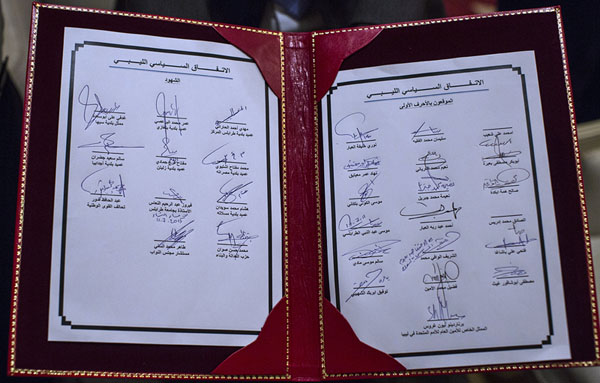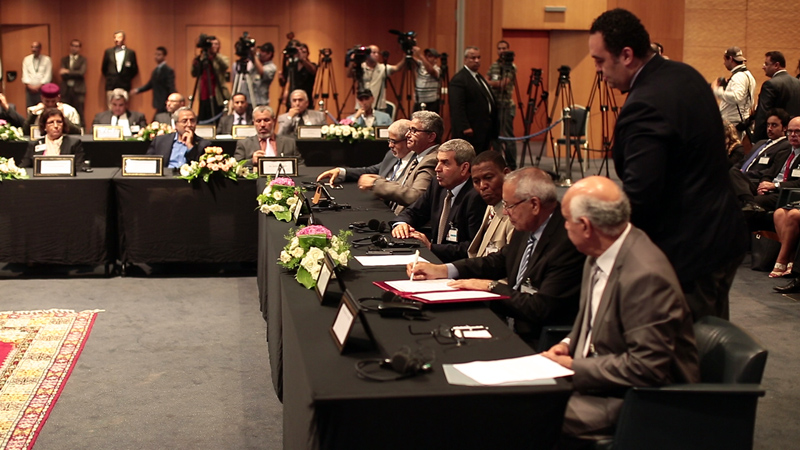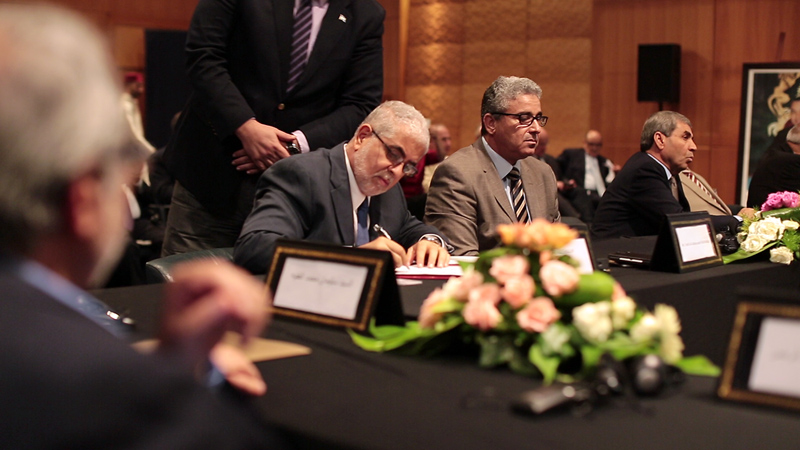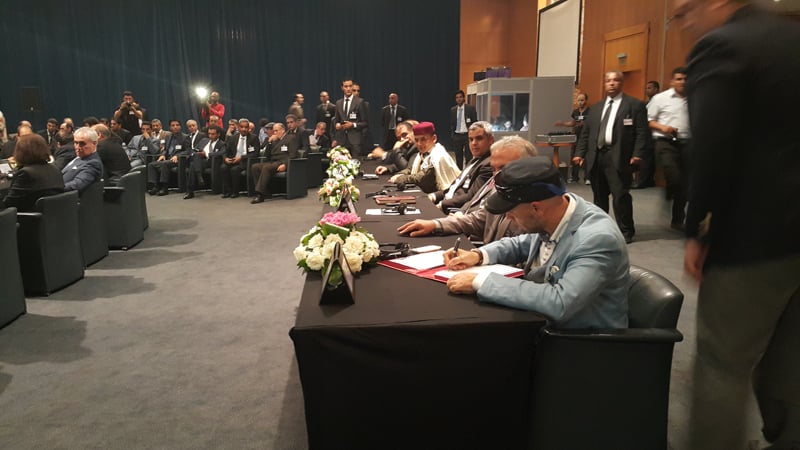By Libya Herald staff.

Tunis, 12 July 2015:
All the delegates attending the UN-brokered negotiations in Skhirat, Morocco have gone ahead and initialled . . .[restrict]the Draft peace deal to set up a Government of National Accord, but without the participation of the team from the General National Congress who are effectively now boycotting proceedings because of objections to parts of the text.
A number of mayors and municipal representatives including those from Misrata, Central Tripoli, Sebha, Ajdabiya, Emsalata and Zliten, as well as party political figures such as Mohamed Sawan, the leader of of the Justice and Construction Party, and Hafez Ghaddour Hafez (the former Libyan ambassador in Rome) for the National Forces Alliance also signed as witnesses to the intialling.
Initialling the agreement allows the delegates to move on to choosing a prime minister and deputy prime ministers who will then select ministers for the Government of National Accord. Once this is done and a number of other issues that will go into annexes to the Draft are agreed, it will be sent to the House of Representatives for approval and then signed into effect.
Thanking the delegates who, he said, had showed courage, commitment and determination, Leon called the initialling a “very important step on the road to peace”. It would allow Libya to complete revolution “by building common ground and reconciling a range of diverse interests”. It was laying the foundation for “a modern, democratic state based on the principles of inclusion, the rule of law, separation of powers and respect for human rights”, he said.

In a joint statement, the ambassadors and special envoys to Libya of Canada, the EU, France, Germany, Italy, Morocco, Portugal, Russia, Spain, Turkey, the UK and the US also welcomed the agreement. But dashing any hopes among members of the GNC in Tripoli that it would be amended, they said it was the “final” draft.
The GNC had said last week that its team would not return to Skhirat unless Leon was prepared to discuss its proposed changes to the Draft and accept that it was the legitimate Libyan parliament, not the House of Representatives.
GNC President Nuri Abu Sahmain had earlier written to Leon saying that the GNC team would return to Skhirat later this week providing he accepted the demands.
Appealing to the GNC delegates to come back and initial the agreement, he said “no text can be perfect”, and that the door still remained open to them. He offered them a route back saying he was confident “that in the weeks ahead we will clarify the issues that remain contentious and address the outstanding concerns”. He also said he was confident “moderate voices” would heed the calls for peace for ordinary Libyans and that “the logic of peace will prevail in the General National Congress”.

The ambassadors and envoys reiterated Leon’s appeal saying that the GNC should support this agreement in the interest of Libya and the Libya people.
However, they also warned that they would take “appropriate actions” against those who tried to stop the Dialogue process from moving ahead to force them to change their minds – a reference to the GNC and the militias and political activists in Tripoli and other towns opposed to the process. They were choosing to destabilise Libya, the ambassadors said, and were putting the country at risk of further instability and extremism.

Turning to the next step, the UN Special Envoy in his speech at Skhirat yesterday called on “all delegates” to agree swiftly on a Government of National Accord and to reach consensus on the annexes.
Apart from naming the Prime Minister and Deputy Prime Minister, these will establish priorities of the new government, a mechanism for selecting members of the 120-member State Council, 90 of whom must come from the GNC, the wording of an amendment to the 2011 Constitutional Declaration to incorporate the Skhirat agreement, and principles for the administration of Libyan financial policies and national assets.
Libya, he said, needed a strong government which the international community would support to deal with the various challenges it faces.
These are primarily security and the growth of terrorism and the Islamic State; the country’s financial chaos and corruption; and Libya’s role in the trafficking of illegal migrants.
Noting the first, Leon stressed that “security actors” (Libya’s varied military bodies, both the official army and the brigades) had a “very important” role in bringing peace to the country and that he would be convening a meeting of them before the signing of the agreement.
He also called on all parties to release any illegally detained prisoners before the end of Ramadan. He said he was encouraged by recent releases which were an important step towards national reconciliation, but many others were still held. “It would be a deserved gift to their families as they celebrate this Eid as well as an unequivocal sign that all parties are genuinely committed to achieving reconciliation”.

Leon paid tribute to the UN, the international community and to neighbouring countries – he singled out Saudi Arabia, the UAE, Turkey and Qatar – for their role in the reaching agreement so far.
The UN and the international community would, he said, work with Libya to “build solid institutions and good governance, and support a swift economic recovery to benefit all the Libyans who have been suffering for so long”.
In their statement, the ambassadors likewise said that their countries were are ready to provide Libya with “a broad array of assistance in sup port of a unified government of national accord”.
Various counties, including the US and the UK, have previously said that they would provide military assistance to Libya to fight terrorism only once a government of national accord was in place.
Meanwhile, in addition to the statement from the ambassadors and envoys, the EU’s foreign policy chief, Federica Mogherini also welcomed the initialling describing it as an important step towards restoring peace and stability in Libya. She too urged the GNC to follow suit and “display a similar spirit of consensus and responsibility”. As soon as a Government of National Accord were established, she said, the EU would provide immediate help to national and local authorities to ensure the rapid resumption of delivery of services.
[/restrict]







